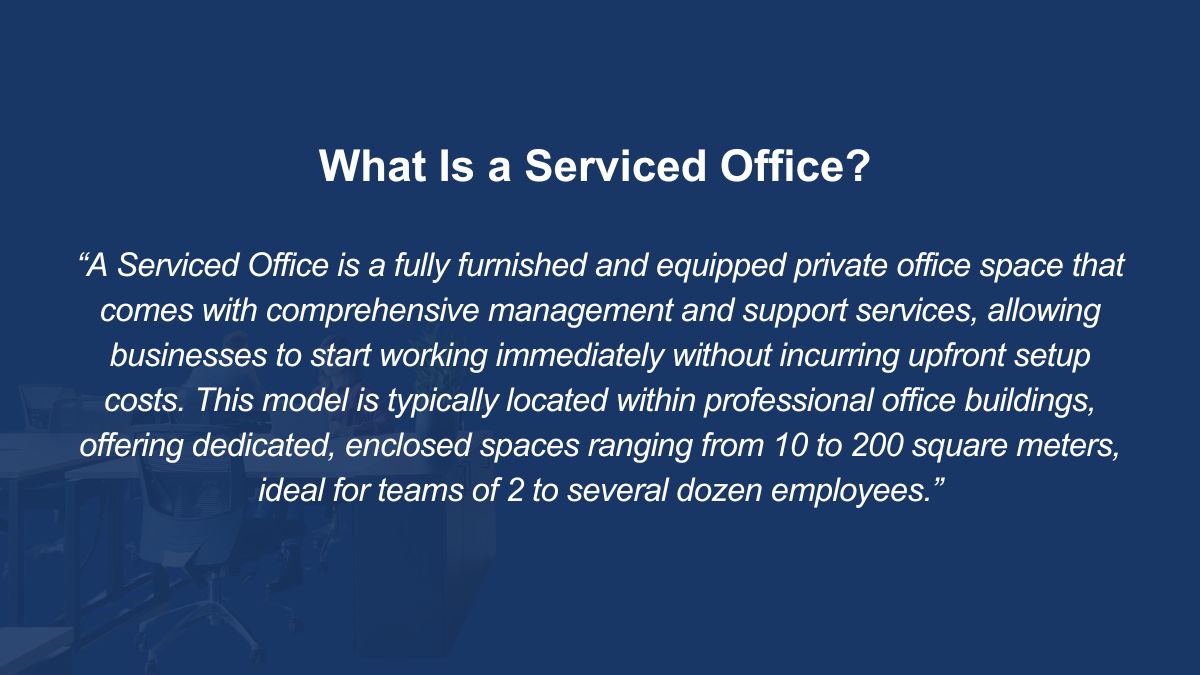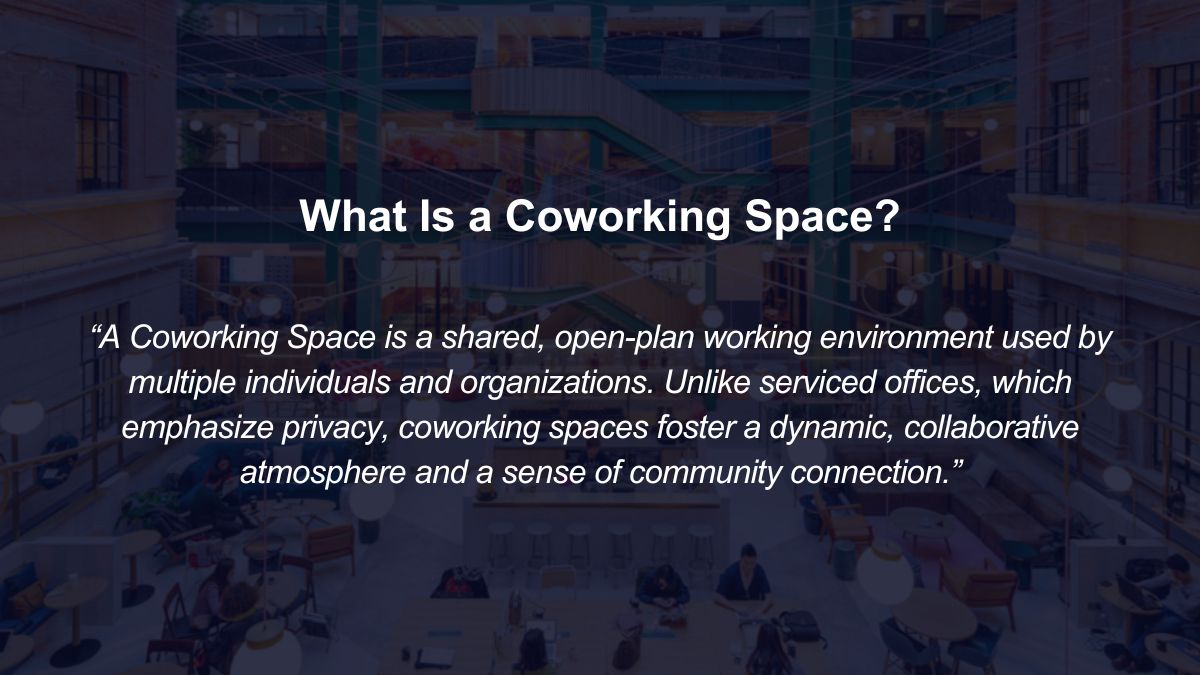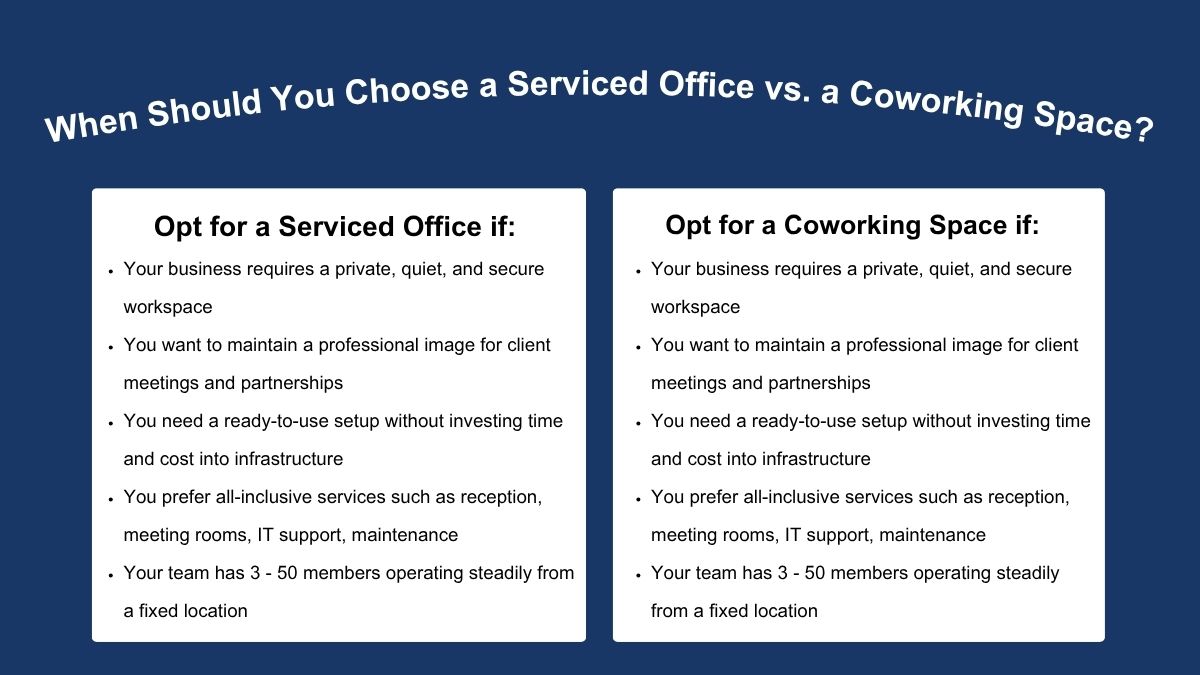The Difference Between Serviced Offices and Coworking Spaces

Serviced Offices and Coworking Spaces are two flexible workspace models increasingly favored by businesses, startups, and freelancers in major cities like Hanoi and Ho Chi Minh City. However, each model offers its own advantages and limitations in terms of space, cost, and user experience. That’s why comparing Serviced Offices and Coworking Spaces is essential to choosing the right solution that aligns with your business’s real operational needs.
Table of Contents
- 1. Overview of Serviced Offices and Coworking Spaces
- 2. Benefits of Serviced Offices for Businesses
- 3. Key Differences Between Serviced Offices and Coworking Spaces
- 4. When Should You Choose a Serviced Office vs. a Coworking Space?
- 5. The Rise of Flexible Workspaces in Vietnam
- 6. Frequently Asked Questions about Serviced Offices & Coworking Spaces
1. Overview of Serviced Offices and Coworking Spaces
1.1 What Is a Serviced Office?
A Serviced Office is a fully furnished and equipped private office space that comes with complete management and support services, allowing businesses to start working immediately without upfront setup investment. This model is typically located within professional office buildings, offering dedicated, enclosed spaces ranging from 10 to 200 square meters, ideal for teams of 2 to several dozen employees.
In addition to private workspace, businesses also gain access to shared amenities such as meeting rooms, pantry, reception services, high-speed internet, printing, and IT support. Lease terms are flexible – available by day, month, or quarter depending on business needs.
- Serviced Offices are best suited for: representative offices, foreign companies, and SMEs seeking a professional image without spending time or resources on office management.
1.2 What Is a Coworking Space?
A Coworking Space is a shared, open-plan working environment used by multiple individuals and organizations. Unlike serviced offices, which emphasize privacy, coworking spaces foster a dynamic, collaborative atmosphere and a sense of community connection.
Coworking spaces offer various workspace options such as hot desks, dedicated desks, and small private offices – all at a significantly lower cost compared to traditional office leases.
Tenants also enjoy access to shared amenities including Wi-Fi, printers, lounge areas, and networking events.
- Coworking spaces are ideal for: freelancers, startups, project-based teams, small businesses, or short-term groups looking to expand their network and optimize their budget.
2. Benefits of Serviced Offices for Businesses
Serviced Offices are an ideal solution for modern companies seeking a professional, flexible, and cost-effective workspace. This model not only helps businesses save time on setup, but also enhances brand image and streamlines operations from day one.
- No setup time required: No need for construction or installation. Everything—furniture, internet, meeting rooms—is ready to use.
- Cost-efficient leasing & operations: One all-inclusive fee covers electricity, water, reception, cleaning, maintenance, and more.
- Professional brand image: Located in modern office buildings, leaving a strong impression on clients and partners.
- Scalable to your team size: Easily adjust space as your company grows—perfect for startups and expanding firms alike.
- Full-service support: Reception, IT, guest handling, pantry, and community events – allowing your team to focus on core business.
3. Key Differences Between Serviced Offices and Coworking Spaces
| Criteria | Serviced Office | Coworking Space |
| Workspace Type | Private, enclosed rooms with lockable doors | Open-plan work area shared among individuals and companies |
| Privacy Level | High – suitable for internal meetings and confidential work | Low – not ideal for sensitive or confidential operations |
| Brand Image | Professional – ideal for meeting clients and partners | Youthful and dynamic – community and networking oriented |
| Ideal Users | SMEs, representative offices, foreign companies | Freelancers, startups, small project teams |
| Rental Costs | Higher, but includes various amenities and services | More affordable, flexible rates depending on desk type and usage duration |
| Lease Terms | Monthly/quarterly contracts, with options for long-term leases | Hourly/daily/monthly – very flexible |
| Included Services | Reception, meeting rooms, internet, IT, maintenance, cleaning… all included in rent | Varies by package – basic utilities may be limited or add-on |
| Scalability | Easy to scale within the same building or operator network | Limited – depends on desk availability, not always guaranteed |
| Community Engagement | Lower – quiet, focused environment | Higher – active networking, community events across industries |
4. When Should You Choose a Serviced Office vs. a Coworking Space?
Choosing between a Serviced Office and a Coworking Space depends on your business size, budget, and operational needs. Below are key recommendations to help you determine the most suitable model:
Opt for a Serviced Office if:
- Your business requires a private, quiet, and secure workspace
- You want to maintain a professional image for client meetings and partnerships
- You need a ready-to-use setup without investing time and cost into infrastructure
- You prefer all-inclusive services such as reception, meeting rooms, IT support, maintenance
- Your team has 3 – 50 members operating steadily from a fixed location
Opt for a Coworking Space if:
- You’re a freelancer, small startup, or project team working short-term
- You’re looking for low-cost and flexible leasing (daily/weekly/monthly)
- You want to expand your network through community events and industry meetups
- You don’t require a private space or high-level confidentiality
- You move frequently or need temporary office space in different areas
Note: Major operators like WeWork, Toong, CirCo, Dreamplex now offer both Serviced Office and Coworking Space under one roof, making it easy for businesses to scale or switch formats as needed.
5. The Rise of Flexible Workspaces in Vietnam
Flexible workspaces – including Serviced Offices and Coworking Spaces – are becoming a preferred choice for many businesses in Vietnam, especially in major markets like Ho Chi Minh City and Hanoi.
5.1 Post-pandemic Growth & the Shift to Hybrid Work
As more companies adopt hybrid working models, demand for short-term leases, all-inclusive offices, and flexible services based on team size has significantly increased.
According to Maison Office, the total leased area of flexible workspaces in Ho Chi Minh City grew by over 35% in 2024, with key operators such as Toong, The Executive Centre, Regus, and Dreamplex capturing the largest market share.
5.2 Startups & Foreign Enterprises Driving Demand
Startups, tech companies, and newly established foreign enterprises in Vietnam often prioritize serviced offices to reduce initial setup costs and accelerate operations.
Example cases include:Cloudstorm VN (Canada), POC Pharma (Vietnam), Intrepid (Singapore) All chose serviced offices during their initial growth phase.
5.3 Premium Buildings Integrating Flexible Workspaces
More Grade A buildings are now incorporating coworking zones and serviced office floors to meet growing demand. Notable examples include: E.Town Central (District 4, HCMC), Cobi Tower (District 7, HCMC), Capital Tower (Hanoi)
5.4 Flexible Workspaces Poised for Strong Growth
With competitive pricing, faster setup, and high adaptability, flexible workspaces are expected to continue booming over the next 2–3 years. Growth will be particularly strong in districts with high startup and FDI density, such as: Thu Duc City (HCMC), Cau Giay District (Hanoi), Tan Binh District (HCMC),…
6. Frequently Asked Questions about Serviced Offices & Coworking Spaces
6.1 Can coworking spaces be rented by the hour?
Yes. Most coworking spaces today offer flexible rental options by the hour, day, or month. This is ideal for freelancers, short-term project teams, or remote workers needing a professional environment for a limited time.
6.2 Do serviced offices support business registration?
Yes. Many serviced office providers assist tenants in registering their business license and legal address, which is especially helpful for representative offices or newly established companies.
6.3 Are serviced offices suitable for foreign companies entering Vietnam?
Absolutely. Serviced offices significantly reduce setup time, streamline administrative processes, and provide full operational support. This makes them a perfect solution for FDI enterprises, representative offices, or businesses testing the Vietnamese market.

Editor and content team manager at Maison Office.
With over 5 years of experience in consulting and extensive content editing in the real estate services and interior design field. Sharing valuable information with customers, partners, and attracting millions of views.






